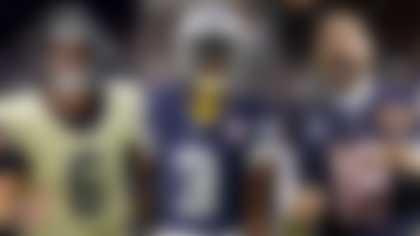The Divisional Round has arrived -- bringing with it several of the league's most potent offenses.
All four top seeds this weekend ranked in the top 10 in total offense -- the Kansas City Chiefs (No. 1 seed in the AFC) ranked first, the Los Angeles Rams (No. 2 seed in the NFC) ranked second, the New England Patriots (No. 2 seed in the AFC) ranked fifth and the New Orleans Saints (No. 1 seed in the NFC) ranked eighth. Teams have struggled all season to stop these high-flying offenses, but their Divisional Round opponents haven't exactly been easy to stop, either.
But that doesn't mean defenses should just give up all hope. Below, I examine the eight offenses playing in this weekend's Divisional Round and reveal the best way for opposing defenses to exploit them.
Indianapolis Colts at Kansas City Chiefs
How to exploit the Indianapolis Colts: Neutralize Marlon Mack and make Andrew Luck force some throws. Yes, Luck has been one of the most prolific quarterbacks in the league this season, but he's made his share of questionable tosses. The way to put Luck into high-pressure and compromising situations is to take away Mack and the run game and make Indy's otherwise balanced offense one-dimensional. Mack may not be Todd Gurley or Ezekiel Elliott, but defenses have to respect him because of the Colts' elite O-line, behind which Mack has thrived over the last four games, averaging 110 rushing yards per contest (including playoffs). Of course, Luck is still capable of beating you through the air. But I really believe defenses that take away the ground game by stacking the box -- while also employing a specific plan for stopping receiver T.Y. Hilton -- have the best chance to stop Indy. Consider that the Colts went 7-1 in regular-season games where they rushed for 100 yards or more and 3-5 when they rushed for less than 100 yards. Consider also that Luck posted a passer rating of 107.4 with a TD-to-INT ratio of 22:8 and three sacks in the first group of games; in the second group of games, his passer rating was 92.8, with a TD-to-INT ratio of 17:7 and 15 sacks.
How to exploit the Kansas City Chiefs: Focus on Travis Kelce and Tyreek Hill -- and pray. The most dangerous aspect of the Chiefs' offense is Patrick Mahomes and the passing game, because neither Spencer Ware nor Damien Williams, who took over at running back after Kareem Hunt's release, possess Hunt's talent -- they don't demand a loaded box. Opposing defenses must rely on their front four to stop the run and put a majority of their efforts into slowing Kelce and Hill. We've seen how quickly this pair can change a game, so double-teaming the tight end and receiver with extra safety help is key. Taking away the Chiefs' dynamic pass attack and challenging them to run the ball is the best option, though it's not a great one. The truth is, Andy Reid's unit is so good, you've got to just do what you can and hang on.
Dallas Cowboys at Los Angeles Rams
How to exploit the Dallas Cowboys: Make Dak Prescott uncomfortable. The run game will be the Cowboys' offensive strength as long as Ezekiel Elliott is in the backfield. Dallas' downfall is often the inconsistency of the quarterback in the passing game -- but that wasn't the case Saturday, as Prescott came through big time in a wild-card win over Seattle. The thing is, Prescott still hasn't shown he can overcome the Xs-and-Os challenges presented to him by opponents on a regular basis. Prescott is most vulnerable when the defense gives him disguises and different looks, making it more difficult for him to dissect what's in front of him. This forces the young passer to go through his progressions, an area in which he has struggled in the past.
How to exploit the Los Angeles Rams: Disguise and delay. The easiest way to exploit the Rams' offense is to stop running back Todd Gurley and put it all on quarterback Jared Goff, who was shaky down the stretch (six TDs, six picks and a 74.8 passer rating in his last five games). Knowing that coach Sean McVay can be in Goff's ear until the play clock hits 15 seconds, defenses should hold what they're going to do on a play, or change looks after McVay can no longer talk to Goff. This negates McVay's ability to call the perfect play to exploit the defense, and Goff is left to make decisions on his own. The third-year quarterback has improved every year, but he's still young and makes poor decisions at times. He also didn't have a great playoff debut in last year's loss to the Falcons (53.3 percent completion rate, one touchdown and a 77.9 passer rating), so he'll likely be dealing with some added pressure to make up for that defeat on Saturday, as well.
Los Angeles Chargers at New England Patriots
How to exploit the Los Angeles Chargers: Let Philip Rivers try to beat you. The health of running back Melvin Gordon is a HUGE concern for the Chargers. Gordon ranked in the top 10 in several offensive categories despite playing in just 12 regular-season games, but his knee issues, including an injury suffered Sunday, make him much less of a threat out of the backfield. Gordon's injuries have caused the Chargers' ground game to be a shell of what it was early in the year. Without a consistent run game, Rivers has struggled of late by forcing throws that have resulted in turnovers. Consider that through Week 12, when Gordon suffered an MCL sprain, Rivers threw for 26 TDs, six picks and 9.1 yards per attempt, while Gordon averaged 123.7 scrimmage yards per game. From Week 13 through last week's wild-card game -- a stretch in which Gordon appeared in just three games while averaging 54.3 scrimmage yards per game -- Rivers threw for six TDs, six picks and 6.9 yards per attempt. Even with the vast amount of talent on L.A.'s roster, this offense isn't too hard to figure out at this time of year. Opposing defenses should try to take away the run game, no matter who's in the backfield, and make Rivers win the game ... or lose it.
How to exploit the New England Patriots: Don't sweat the deep threat. Without suspended receiver Josh Gordon, the Patriots are missing that big-play receiver. Rob Gronkowski has been slow. Julian Edelman isn't a deep threat unless he breaks a tackle. And Chris Hogan doesn't scare anyone. For the first time in a while, the Patriots' offense is slow, and they know it. That's why we've seen them line up in I-formation and run straight at the defense. Knowing New England's receivers aren't going to go over the top of the defense, defenders will be able to gamble a bit, sitting on and jumping short routes.
Philadelphia Eagles at New Orleans Saints
How to exploit the Philadelphia Eagles: Keep the ground game bottled up. The Eagles' run game hasn't changed since I last discussed it a week ago. The Eagles ranked 28th in rushing this season and continued to struggle in Sunday's wild-card win over the Bears, gaining a measly 42 rushing yards (1.83 yards per carry). Without a dynamic rushing attack -- like the Eagles had last season -- Doug Pederson's system, which features heavy play-action and run-pass options, won't be as effective. Nick Foles will still give his weapons opportunities to make plays downfield, but I'm unsure if the Eagles can rely on him to do that consistently. That said, defenses that can continue to keep Philly's run game at bay have the best shot at dethroning the defending champ's offense -- and the Saints, with their second-ranked run defense, are up first on Sunday.
How to exploit the New Orleans Saints: Limit the damage. On paper, the Saints have no glaring flaw, but the teams that have had the most success against them -- like the Cowboys did in Week 13 -- made it a point to stop running back Alvin Kamara in all aspects, as well as receiver Michael Thomas. Thomas will get his catches, but opposing defenses must limit big plays, matching up against Kamara -- using safety help if needed -- to keep the dual-threat running back at a sub-superhuman level. In addition, bringing interior pressure has troubled Drew Brees in the past, because it hinders the 6-foot quarterback's vision and forces him to get the ball out quickly, limiting the Saints' big plays down the field.
Follow David Carr on Twitter @DCarr8.












